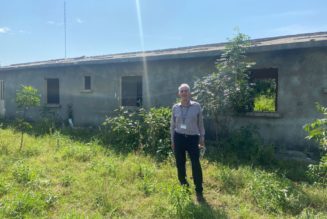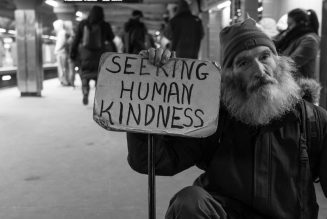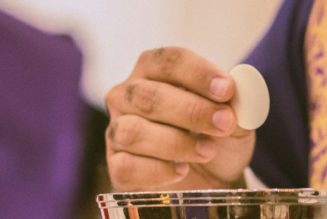
Advice from Holly Taylor Coolman, a wife, mother, and theology professor, who’s been at it longer than most.
I’ve seen more and more people remark on social media and elsewhere that this coronavirus shelter-in-place time is getting to them. It’s not just claustrophobia or loneliness, depending on your circumstances, but a time of anxiety can hit us at our weakest spots. I’ve seen Holly Taylor Coolman describe herself as “the ghost of quarantine future.” Assistant professor of theology at Providence College in Rhode Island, Coolman, together with her family, has been in the quarantine zone since a few weeks before the most of us started realizing it would become our life. She’s a sober voice on social media for not just keeping safe but also for nourishing the soul, body, and mind, loving your neighbor and family, and keeping the faith quite literally during these odd days. So I asked her a few questions about what we’re going through, for her advice and insights. We talk, too, about issues close to her heart, including adoption.
Kathryn Jean Lopez: You’ve been doing this quarantine thing longer than most. What’s your best advice?
Holly Taylor Coolman: Get a routine. Even simple things like getting dressed in real clothes every morning and sitting down to a real dinner every night have helped to steady me. I have been thinking a lot about the rich resources of monasticism and the deep calm fostered by rhythms of work, rest, and prayer. This is a moment to rediscover those things.
This will have to look different for different people. Some people might benefit from extensive daily and weekly plans, and might incorporate the Divine Office or other kinds of personal prayer. We have had to be a little more modest at our house: some clear routines, with lots of flexibility.
For us, it’s not just a coping mechanism. It has also created new possibilities. Dinner is a more relaxed event now. No one has anywhere to go! So we have been reading a short gospel passage at the table every evening. Maybe we will even form a strong enough habit to carry it forward!
Lopez: What was the moment you realized you really truly had to take staying home seriously and carefully?
Coolman: It happened pretty suddenly for us when, in the first week of March, we got a call from our state’s department of health telling us that our two high-schoolers had been exposed to the coronavirus. My husband and I decided that we would quarantine with them. That was also the moment when some very sobering stories and photos were starting to appear from China. So, within 24 hours, our household was plunged into this new reality.
Lopez: How do you do it with a house full of children? And, I think I read, an electric guitar or drums, and a guinea pig, who I gather is loud?
Coolman: Our house is an adventure, you might say. We have four kids still at home: a college student who is now back home, two high-schoolers, and a fourth-grader. And yes, a guinea pig who squeals. And a dog who barks. Our kids are fantastic. They love music and art and skateboarding and a million other things. For that reason — especially for someone like me, who is pretty introverted — they are also exhausting sometimes. Of course, I probably wear them out, too. We are not about perfect at our house. We are about trying our best and forgiving each other, and, if things go especially well, laughing together along the way. My husband is an amazingly patient and consistent person and a wonderful father. In many ways, he is our rock.
Lopez: Is it really Christian charity to stay home? How can this time help us think about Catholic social teaching in a deeper and more practical way?
Coolman: It really is Christian charity to stay home. We have some smart and committed people working hard to determine what policies are best, and, although that varies by location, they have made clear that slowing down the transmission of this virus will save lives.
I think the unusual character of this crisis can help wake us up, in a sense. The solidarity that Catholic social teaching calls for is not sentimental, and not just a matter of being “nice” to each other. It is a matter of contributing to the true good of the other, even when that is difficult and even when it is unfamiliar. It may be that social distancing can become a new test case in our collective imagination, reminding us of these fundamental principles.
Lopez: Tell me if I’m crazy. I’ve been watching Andrew Cuomo the last few days and weeks and hearing a commitment to life that I’ve literally been praying for a least the better part of a decade, if not longer. Can this be something real that can last and even heal our politics surrounding abortion and assisted suicide and a whole lot more?
Coolman: I am holding my breath on this one. I have hoped and prayed for so long that we could find ways to break through the stalemate of polarization. I believe there is actually a certain groundswell of support for a “whole life” position that echoes Catholic teaching by emphasizing the sacredness of each and every human life. We can pray that this crisis will also give people fresh perspective.
Lopez: You ran for a local office a little while back. Why did you do it? What did you learn? What are your prayers for politics right now?
Coolman: It was not something I ever planned to do. I just saw a specific moment where I felt like I might be able to make a specific contribution. One of my goals was to run unapologetically as a candidate who was pro-life in the context of a larger whole-life commitment. I was not elected, but I heard from so many people who said that they were deeply gratified to see that position represented.
Lopez: You’re not only Catholic, you’re a theology professor. How are you dealing with not being able to go to Mass?
Coolman: It is very strange, to be sure. Especially on Sunday mornings, it just feels very wrong. I have tried to remind myself, though, of the stories of saints who had to live without the Eucharist, sometimes for extended periods. The sacrament is a means to our true end, which is union with Christ and, therefore, union with God. In this Lenten season in which we have to do without it, we are pressed to look for the other avenues through which we can also seek that union: prayer and contemplation, fasting, and acts of love to those around us, in whom we can see Christ’s face.
Lopez: Can you even pray with a house full of children? What is your prayer like?
Coolman: Not leaving the house has definitely made it harder for me — especially when everyone else is home all the time, too! Over years of being a mother, I have come to practice prayer throughout my day, though. In recent years, I have really relied on the simple prayer of St. Faustina: “Jesus, I trust in you.” If there is any prayer for the present moment, I think that is it.
Lopez: One of the things I’ve been talking more about over the past few years is foster care and adoption. And to be honest I’m not entirely sure what to do and say about that right now — I fear that so many children are in added limbo right now because of all of the need for precautions. You must be thinking about this too, because they could have been your children. What are you thinking and how can the Christian community think more about this?
You actually wrote about foster care and adoption and Catholics and plague as this crisis was just about to start. What are your thoughts about all that now?
What more do Catholics need to pray about and discern in a particular way on foster care and adoption?
Coolman: I believe strongly that foster care and adoption are undertakings to which Christians generally and Catholics specifically are called — and for which they are especially equipped. This is true in at least a couple of different ways. We need individual households to hear this call and ask seriously whether they can offer a home to children who need one. Beyond that, though, we need communities, whether parishes or other collectives, to consider coming to this work together. In general, families do better when they are a part of a web of community. That is only more true for families in which kids are healing from earlier traumas. I am the first person to say it is very demanding work. But there are so many reasons to be optimistic about the possibilities. When people are able to get educated, when they have the larger community support they need, families can find fruitful ways to love in the midst of the demands. What could be more fitting for those of us who have been loved by God?
Lopez: What’s your advice about hope to people feeling especially anxious and even hopeless now? Out of a job? Have someone sick? Maybe sick yourself? Maybe someone you loved has died and you couldn’t be there with them, and can’t even have a funeral Mass or service, never mind physically be there?
Coolman: This pandemic is the kind of experience that forces us to drop pretense and ask two questions: What can I give? And what do I need? Most of us would benefit by asking first what we have to give. Maybe we drop off food or supplies to those who need it. Maybe we can be truly present to those closest to us. Even if we are weak or suffering, we can pray and we can offer that suffering for others. But it is a two-way street. Our God is a merciful God, and we are called to be merciful, too. I think that can give us the courage be honest: “I need help,” or “I need a break.” People in great distress — those who are, for example, grieving a loved one — may hardly be able to voice the words, even. But we can all reach out to other people, and to the Lord, as well, sharing our need in unapologetic vulnerability. Psalm 31:2 reminds us that God’s people have been doing this for a long, long time. It offers words we may want to use ourselves: “Turn your ear to me, come quickly to my rescue.”
Lopez: Anything you’ve learned so far? Maybe even something small and fun?
Coolman: I have learned that if you can give the guinea pig some attention, she won’t squeal so plaintively. Right now, we all just need a little extra love.








